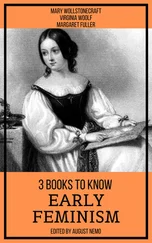Mary Wollstonecraft - Maria; Or, The Wrongs of Woman
Здесь есть возможность читать онлайн «Mary Wollstonecraft - Maria; Or, The Wrongs of Woman» — ознакомительный отрывок электронной книги совершенно бесплатно, а после прочтения отрывка купить полную версию. В некоторых случаях можно слушать аудио, скачать через торрент в формате fb2 и присутствует краткое содержание. Жанр: Биографии и Мемуары, literature_18, foreign_antique, на английском языке. Описание произведения, (предисловие) а так же отзывы посетителей доступны на портале библиотеки ЛибКат.
- Название:Maria; Or, The Wrongs of Woman
- Автор:
- Жанр:
- Год:неизвестен
- ISBN:нет данных
- Рейтинг книги:5 / 5. Голосов: 1
-
Избранное:Добавить в избранное
- Отзывы:
-
Ваша оценка:
- 100
- 1
- 2
- 3
- 4
- 5
Maria; Or, The Wrongs of Woman: краткое содержание, описание и аннотация
Предлагаем к чтению аннотацию, описание, краткое содержание или предисловие (зависит от того, что написал сам автор книги «Maria; Or, The Wrongs of Woman»). Если вы не нашли необходимую информацию о книге — напишите в комментариях, мы постараемся отыскать её.
Maria; Or, The Wrongs of Woman — читать онлайн ознакомительный отрывок
Ниже представлен текст книги, разбитый по страницам. Система сохранения места последней прочитанной страницы, позволяет с удобством читать онлайн бесплатно книгу «Maria; Or, The Wrongs of Woman», без необходимости каждый раз заново искать на чём Вы остановились. Поставьте закладку, и сможете в любой момент перейти на страницу, на которой закончили чтение.
Интервал:
Закладка:
Sometimes, with a strict injunction of silence, Jemima would allow Maria, at the close of evening, to stray along the narrow avenues that separated the dungeon-like apartments, leaning on her arm. What a change of scene! Maria wished to pass the threshold of her prison, yet, when by chance she met the eye of rage glaring on her, yet unfaithful to its office, she shrunk back with more horror and affright, than if she had stumbled over a mangled corpse. Her busy fancy pictured the misery of a fond heart, watching over a friend thus estranged, absent, though present—over a poor wretch lost to reason and the social joys of existence; and losing all consciousness of misery in its excess. What a task, to watch the light of reason quivering in the eye, or with agonizing expectation to catch the beam of recollection; tantalized by hope, only to feel despair more keenly, at finding a much loved face or voice, suddenly remembered, or pathetically implored, only to be immediately forgotten, or viewed with indifference or abhorrence!
The heart-rending sigh of melancholy sunk into her soul; and when she retired to rest, the petrified figures she had encountered, the only human forms she was doomed to observe, haunting her dreams with tales of mysterious wrongs, made her wish to sleep to dream no more.
Day after day rolled away, and tedious as the present moment appeared, they passed in such an unvaried tenor, Maria was surprised to find that she had already been six weeks buried alive, and yet had such faint hopes of effecting her enlargement. She was, earnestly as she had sought for employment, now angry with herself for having been amused by writing her narrative; and grieved to think that she had for an instant thought of any thing, but contriving to escape.
Jemima had evidently pleasure in her society: still, though she often left her with a glow of kindness, she returned with the same chilling air; and, when her heart appeared for a moment to open, some suggestion of reason forcibly closed it, before she could give utterance to the confidence Maria’s conversation inspired.
Discouraged by these changes, Maria relapsed into despondency, when she was cheered by the alacrity with which Jemima brought her a fresh parcel of books; assuring her, that she had taken some pains to obtain them from one of the keepers, who attended a gentleman confined in the opposite corner of the gallery.
Maria took up the books with emotion. “They come,” said she, “perhaps, from a wretch condemned, like me, to reason on the nature of madness, by having wrecked minds continually under his eye; and almost to wish himself—as I do—mad, to escape from the contemplation of it.” Her heart throbbed with sympathetic alarm; and she turned over the leaves with awe, as if they had become sacred from passing through the hands of an unfortunate being, oppressed by a similar fate.
Dryden’s Fables, Milton’s Paradise Lost, with several modern productions, composed the collection. It was a mine of treasure. Some marginal notes, in Dryden’s Fables, caught her attention: they were written with force and taste; and, in one of the modern pamphlets, there was a fragment left, containing various observations on the present state of society and government, with a comparative view of the politics of Europe and America. These remarks were written with a degree of generous warmth, when alluding to the enslaved state of the labouring majority, perfectly in unison with Maria’s mode of thinking.
She read them over and over again; and fancy, treacherous fancy, began to sketch a character, congenial with her own, from these shadowy outlines.—“Was he mad?” She reperused the marginal notes, and they seemed the production of an animated, but not of a disturbed imagination. Confined to this speculation, every time she re-read them, some fresh refinement of sentiment, or acuteness of thought impressed her, which she was astonished at herself for not having before observed.
What a creative power has an affectionate heart! There are beings who cannot live without loving, as poets love; and who feel the electric spark of genius, wherever it awakens sentiment or grace. Maria had often thought, when disciplining her wayward heart, “that to charm, was to be virtuous.” “They who make me wish to appear the most amiable and good in their eyes, must possess in a degree,” she would exclaim, “the graces and virtues they call into action.”
She took up a book on the powers of the human mind; but, her attention strayed from cold arguments on the nature of what she felt, while she was feeling, and she snapt the chain of the theory to read Dryden’s Guiscard and Sigismunda.
Maria, in the course of the ensuing day, returned some of the books, with the hope of getting others—and more marginal notes. Thus shut out from human intercourse, and compelled to view nothing but the prison of vexed spirits, to meet a wretch in the same situation, was more surely to find a friend, than to imagine a countryman one, in a strange land, where the human voice conveys no information to the eager ear.
“Did you ever see the unfortunate being to whom these books belong?” asked Maria, when Jemima brought her slipper. “Yes. He sometimes walks out, between five and six, before the family is stirring, in the morning, with two keepers; but even then his hands are confined.”
“What! is he so unruly?” enquired Maria, with an accent of disappointment.
“No, not that I perceive,” replied Jemima; “but he has an untamed look, a vehemence of eye, that excites apprehension. Were his hands free, he looks as if he could soon manage both his guards: yet he appears tranquil.”
“If he be so strong, he must be young,” observed Maria.
“Three or four and thirty, I suppose; but there is no judging of a person in his situation.”
“Are you sure that he is mad?” interrupted Maria with eagerness. Jemima quitted the room, without replying.
“No, no, he certainly is not!” exclaimed Maria, answering herself; “the man who could write those observations was not disordered in his intellects.”
She sat musing, gazing at the moon, and watching its motion as it seemed to glide under the clouds. Then, preparing for bed, she thought, “Of what use could I be to him, or he to me, if it be true that he is unjustly confined?—Could he aid me to escape, who is himself more closely watched?—Still I should like to see him.” She went to bed, dreamed of her child, yet woke exactly at half after five o’clock, and starting up, only wrapped a gown around her, and ran to the window. The morning was chill, it was the latter end of September; yet she did not retire to warm herself and think in bed, till the sound of the servants, moving about the house, convinced her that the unknown would not walk in the garden that morning. She was ashamed at feeling disappointed; and began to reflect, as an excuse to herself, on the little objects which attract attention when there is nothing to divert the mind; and how difficult it was for women to avoid growing romantic, who have no active duties or pursuits.
At breakfast, Jemima enquired whether she understood French? for, unless she did, the stranger’s stock of books was exhausted. Maria replied in the affirmative; but forbore to ask any more questions respecting the person to whom they belonged. And Jemima gave her a new subject for contemplation, by describing the person of a lovely maniac, just brought into an adjoining chamber. She was singing the pathetic ballad of old Rob 3 3 A blank space about ten characters in length occurs here in the original edition [Publisher’s note].
with the most heart-melting falls and pauses. Jemima had half-opened the door, when she distinguished her voice, and Maria stood close to it, scarcely daring to respire, lest a modulation should escape her, so exquisitely sweet, so passionately wild. She began with sympathy to pourtray to herself another victim, when the lovely warbler flew, as it were, from the spray, and a torrent of unconnected exclamations and questions burst from her, interrupted by fits of laughter, so horrid, that Maria shut the door, and, turning her eyes up to heaven, exclaimed—“Gracious God!”
Интервал:
Закладка:
Похожие книги на «Maria; Or, The Wrongs of Woman»
Представляем Вашему вниманию похожие книги на «Maria; Or, The Wrongs of Woman» списком для выбора. Мы отобрали схожую по названию и смыслу литературу в надежде предоставить читателям больше вариантов отыскать новые, интересные, ещё непрочитанные произведения.
Обсуждение, отзывы о книге «Maria; Or, The Wrongs of Woman» и просто собственные мнения читателей. Оставьте ваши комментарии, напишите, что Вы думаете о произведении, его смысле или главных героях. Укажите что конкретно понравилось, а что нет, и почему Вы так считаете.












